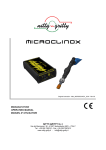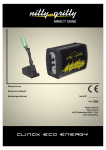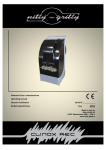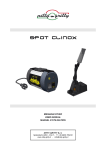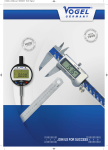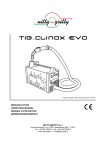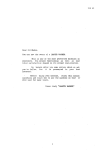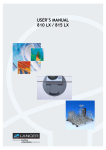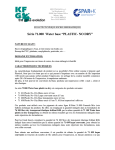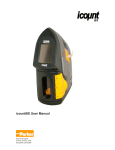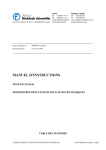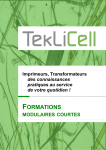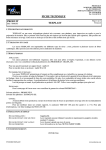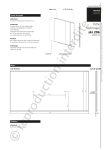Download Manuale d`uso Operating Manual Manuel d`utilisation - Nitty
Transcript
Manuale d’uso Operating Manual Manuel d’utilisation Serial N° ……………… Year 2014 Made in Italy by Nitty-Gritty Srl Via dei Marmorari, 36 41057 Spilamberto (MO) – ITALY Tel. +39 059 785210 - Fax: +39 059 7861612 www.nitty-gritty.it - [email protected] 5 IT – Indice Immagini della macchina ……………………………………………………………………………………………………… 1. Caratteristiche della macchina …………………………………………………………………………………………. 1.1. Campo di utilizzo …………………………………………………………………………………………………… 1.2. Dati tecnici …………………………………………………………………………………………………………. 1.3. Componenti della macchina ……………………………………………………………………………………… 1.4. Movimentazione ed immagazzinamento della macchina …………………………………………………….. 1.5. Dotazione ………………………………………………………………………………………………………….. 2. Sicurezza ………………………………………………………………………………………………………….………… 2.1. Dispositivi di protezione individuale …………………………………………………………………..………… 2.2. Dispositivi di protezione integrati nella macchina …………………………………………………….………… 2.3. Rischi residui ……………………………………………………………………………………………………… 3. Carica batterie ……………………………………………………………………………………………………………… 4. Retini di marcatura ….…………….………………………………………………………………………………………. 5. Installazione degli inserti in grafite per la marcatura ……………………………………………………………… 6. Installazione dei feltri per la marcatura ……………………………………………………………………………….. 7. Installazione elettrica .……………………………………………………….……………………………………………. 8. Operazioni di marcatura ………………………………………………………………………………………………….. 9. Manutenzione …………………………………………………………………………………………………………… 9.1. Manutenzione ordinaria .…………..……………………………………………………………………………. 9.2. Manutenzione straordinaria ………………………………………………………………………………………. 10. Smaltimento e rottamazione …………………………………………………………………………………………... 11. Dichiarazioni di conformità: CE - RoHS …………………………………………………………………………….. 6 10 10 10 11 11 11 12 12 12 12 13 13 13 14 14 14 15 15 15 15 15 GB – Index Machine pictures .………….….…………………………………………………………………………………………......... 1. Machine features …………………….…………………………………………………………………………………… 1.1. Unit application …………………………………………………………………………………………………… 1.2. Technical datas …………………………………………………………………………………………………… 1.3. Machine components ……………………………………………………………………………………………. 1.4. Mobilization and storage of the machine ………………………………………………………………………. 1.5. Equipment ………………………………………………………………………………………………………… 2. Safety ..……………………………………………………………………………………………………………………… 2.1. Personal protective equipment ……………………………………..……………………………………………. 2.2. Protection devices …………………………………………………………………………………………………. 2.3. Residual risks ……………………………………………………………………………………………………… 3. Battery charger ……………………………………………………………………………………………………………. 4. Marking screen ……………………………….…..………………………………………………………………………. 5. Marking graphite inserts installation ………………………………………………………………………………….. 6. Marking felts installation ..………………………………………………………………………………………………. 7. Electric installation ………………………………………………………………………………………………………. 8. Marking operations ……………………………………………………………………………………………………….. 9. Maintenance …………………………………………………………………………………………….………………… 9.1. Ordinary maintenance ……………………………………………………………………………..….….………. 9.2. Special maintenance ……………………………………………………………………………………..………. 10. Disposal and Scrapping ……………………………………………………………………………………….……….. 11. Declaration of conformity: CE – RoHS ……………………………………………………………………….……….. 6 16 16 16 17 17 17 18 18 18 18 19 19 19 20 20 20 21 21 21 21 21 FR - Index Machine images ……………….………………………………………………………………………………………………… 1. Caractéristiques de la machine …..…………………………………………………………………………………….. 1.1. Champ d’utilisation ………..………………………………………………………………………………………. 1.2. Caractéristiques techniques ……………………………………………………………………………………… 1.3. Eléments de la machine …….…………………………………………………………………………………… 1.4. Déplacement et stockage de la machine ………………………………………………………………………. 1.5. Fourniture ….……………………………………………………………………………………………………….. 2. Sécurité ………………………………………………………………………………………………………….………… 2.1. Dispositifs de protection individuelle ……………………………………………………………..……..……… 2.2. Dispositifs de protection ……………………………………………….………………………………….……… 2.3. Risques résiduelles ………………………………………………………………………………………..……… 3. Chargeur de batterie …………………………………………………………………………………………………….. 4. Trame serigraphique …..……………………………....……………………………………………………………….. 5. Installation des inserts en graphite de marquage ..………………………………………………………………… 6. Installation des feutres de marquage ………………………………………………………………………………… 7. Alimentation electrique ………………………………………………………………………………………………… 8. Operations de marquage ..……………………………………………………………………………………………… 9. Entretien …………………………………………………………………………………………………………………… 9.1. Entretien courant ………………………………………………………………………………………………….. 9.2. Entretien exceptionnel …………………………………………………………………………………………….. 10. Élimination et mise au rebut ………………… ………………………………………………………………………… 11. Déclaration de conformité: CE – RoHS ………………………………………………………………………………. 6 22 22 22 23 23 23 24 24 24 24 25 25 25 26 26 26 27 27 27 27 27 A 10 2 7 3 1 4 17 6 5 8 9 11 10 12 14 13 15 6 16 18 B C D E F G H I 7 E CHEMICAL SOLUTIONS Ref. DESCRIPTION 16 MARKING ELECTROLYTE CLXMKG000005.100 (Pack: 1x100ml) - MARKING ELECTROLYTE CLXMKG000005.1000 (Pack: 1x1L) INOX FIT 18 Neutralizing solution after cleaning / polishing / marking ESXFIT000001.06 (Pack: 6x1L) PER LA MARCATURA SU RAME, OTTONE ED ACCIAIO ZINCATO VOGLIATE CONSULTARCI FOR MARKING ON COPPER, BRASS AND GALVANIZED STEEL PLEASE CONTACT POUR LE MARQUAGE SUR LE CUIVRE, LAITON ET ACIER GALVANISE CONTACTEZ NOUS [email protected] - +39 059 785210 -8- I ACCESSORIES for marking GRAPHITE INSERTS 12a MARKING FELTS O-RING 13a 14a CLXMKG000001 (Pack: 1) 12b CLXMKG000006 (Pack: 20) CLX004003 (Pack: 5) 13b 14b CLXMKG000000 (Pack: 1) CLXMKG000007 (Pack: 20) PRINT for MARKING TAPE CLX004009 (Pack: 5) MARKING TAPE 19a 20a ESXMKGPRI001 (Pack: 1) ESXMKG000030.50 (100mm x 50m) 19b 20b CLXMKGPRI002 (Pack: 1) CLXMKG000023 (24mm x 3m) MARKING SCREEN 15 [email protected] -9- ITALIANO Attenzione Leggere attentamente questo manuale prima di procedere con qualsiasi operazione. Il manuale fornisce le principali informazioni per una adeguata e sicura installazione, per l’avviamento, l’esercizio e la manutenzione della macchina. Il manuale fa parte integrante della macchina e deve essere conservato con cura fino allo smantellamento finale della macchina stessa. La lingua ufficiale scelta dal costruttore per la realizzazione del manuale è l’italiano. Non si assumono responsabilità per traduzioni, in altre lingue, non conformi al significato originale. Il presente manuale rispecchia lo stato della macchina al momento della fornitura e non potrà essere ritenuto inadeguato solo perché successivamente aggiornato in base a nuove esperienze. IL SERVIZIO ASSISTENZA CLIENTI NITTY-GRITTY ([email protected]) è a Vostra disposizione per rispondere alle domande relative all’acquisto, all’impiego e alle regolazione della macchina e dei suoi accessori. 1. CARATTERISTICHE DELLA MACCHINA 1.1. CAMPO DI UTILIZZO La macchina è stata progettata e realizzata per eseguire la marcatura elettrochimica su pezzi in acciaio inossidabile. La macchina permette di imprimere istantaneamente sul metallo qualunque logo desiderato. Il principio elettrochimico si realizza attraverso l’elettrolisi di liquidi neutri che non sono né corrosivi né irritanti. NITTY-GRITTY si ritiene sollevata da eventuali responsabilità in caso di uso non corretto della macchina, come ad esempio: uso improprio della macchina od uso da parte di personale non addestrato; uso contrario alla normativa specifica; installazione non corretta; difetti di alimentazione; carenze gravi nella manutenzione; modifiche od interventi non autorizzati; utilizzo di ricambi non originali o non specifici per il modello; utilizzo di liquidi non consigliati da NITTY-GRITTY o non specifici per questo modello; inosservanza totale o parziale delle istruzioni; eventi eccezionali; … ed altri usi impropri. 1.2. DATI TECNICI Modello: Tensione di alimentazione: HANDY PRINT 11,6 V Tensione elettrodo: Peso macchina (a vuoto): Dimensioni macchina: 12 V AC 0,3 kg 160x62x35 mm - 10 - 1.3. COMPONENTI DELLA MACCHINA (FIG. A) 1. 2. 3. 4. 5. 6. 7. 8. 9. Interruttore generale Presa per cavo alimentazione impugnatura Presa per cavo di massa Presa per carica batteria Led macchina accesa Led overload Clip Cavo di alimentazione impugnatura Cavo di massa 10. 11. 12. 13. 14. 15. 16. 17. 18. Impugnatura Grano di serraggio Inserto in grafite per la marcatura Feltro per la marcatura O-ring di fissaggio feltro Retino serigrafico Elettrolita per la marcatura (100ml) Carica batteria Soluzione neutralizzante Inox Fit (500ml) 1.4. MOVIMENTAZIONE ED IMMAGAZZINAMENTO DELLA MACCHINA Trasporto La macchina è dotata di una clip (7) che ne consente il trasporto alla cintura. Vedere dimensioni e peso dello strumento (Paragrafo 1.2). Immagazzinamento La macchina deve essere conservata in luogo riparato e privo di umidità a salvaguardia soprattutto delle apparecchiature elettriche contenute in essa. 1.5. DOTAZIONE Nr. 1 Nr. 1 Nr. 1 Nr. 1 Nr. 1 Nr. 1 macchina HANDY PRINT impugnatura (10) cavo di alimentazione impugnatura (8) cavo di massa (9) chiave esagonale di 2,5mm inserto standard in grafite per la marcatura (12a) Nr. 20 feltri standard per la marcatura (13a) Nr. 5 O-rings (14a) Nr. 1 elettrolita per la marcatura - 100ml (16) Nr. 1 retino serigrafico NITTY-GRITTY - campione di prova (15) Nr. 1 soluzione neutralizzante Inox Fit 500ml (18) Nr. 1 manuale d’uso - 11 - 2. SICUREZZA La macchina è realizzata nel rispetto delle norme comunitarie in materia di sicurezza ed è fornita con marcatura CE. La macchina HANDY PRINT può essere impiegata con un elevato grado di sicurezza a condizione che vengano osservate tutte le norme di sicurezza, del buon senso, le raccomandazioni del fabbricante e le leggi attualmente in vigore. È indispensabile che i responsabili della sicurezza del personale si impegnino a far leggere questo manuale prima di consentire l’uso della macchina da parte degli addetti. 2.1. DISPOSITIVI DI PROTEZIONE INDIVIDUALE Durante l’utilizzo della macchina si consiglia di indossare opportuni dispositivi di protezioni individuali quali: guanti protettivi; PREVENZIONI BRUCIATURE SHOCK ELETTRICI Durante il funzionamento della macchina sia i pezzi sottoposti a lavorazione sia gli inserti installati sull’impugnatura possono raggiungere temperature elevate. Adeguati guanti di protezione devono essere utilizzati per prevenire eventuali bruciature. Analoghe precauzioni devono essere osservate per la rimozione dei feltri e degli inserti. Tutti gli shock elettrici sono potenzialmente fatali. Non utilizzare la macchina in locali umidi. Non toccare mai parti sotto tensione. Nel caso si verificasse anche una minima sensazione di scossa elettrica, spegnere immediatamente l’apparecchio e non usarlo fino a quando il problema non sia stato individuato e risolto da personale abilitato. Ispezionare frequentemente il cavo di alimentazione e qualora si riscontrassero danni o abrasioni del rivestimento di protezione dello stesso, procedere immediatamente alla sua sostituzione. Eseguire le operazioni di manutenzione solamente dopo aver scollegato la macchina dalla rete elettrica. La manutenzione sulle parti elettriche deve essere eseguita solo da personale esperto ed autorizzato. Utilizzare sempre ricambi originali. SOLUZIONI ELETTROLITICHE La macchina richiede per il funzionamento l’utilizzo di soluzioni elettrolitiche neutre, quindi né corrosive né irritanti per gli occhi e per la pelle. Non utilizzare prodotti diversi da quelli indicati nel presente manuale (in caso contrario decadrà ogni forma di garanzia) e non unire tali prodotti con altri. Conservare gli elettroliti in luogo sicuro e nei contenitori originali. In caso di contatto accidentale con gli occhi o con la pelle o in caso di ingestione attenersi alle indicazioni riportate sulle schede di sicurezza dei prodotti. È possibile richiedere una copia delle schede di sicurezza delle soluzioni elettrolitiche a: NITTY-GRITTY S.R.L. Tel.: +39 059 785210 E-mail: [email protected] 2.2. DISPOSITIVI DI PROTEZIONE INTEGRATI NELLA MACCHINA PROTEZIONE CONTRO I CORTOCIRCUITI La macchina è dotata di un dispositivo di protezione contro i cortocircuiti che si possono verificare tra l’inserto installat o sull’impugnatura ed il pezzo in lavorazione. In caso di cortocircuito la macchina si arresta automaticamente e il led di overload (6) si accende. Il ripristino è automatico una volta che si stacca l’impugnatura dal pezzo in lavorazione. 2.3. RISCHI RESIDUI I rischi durante l’utilizzo della macchina sono estremamente ridotti se vengono seguite sia le norme sulla sicurezza indicate nel capitolo 2.1 sia le modalità d’uso riportate in questo manuale. Rimangono tuttavia i rischi legati all’elevata temperatura raggiunta dagli inserti in grafite, pertanto si raccomanda l’utilizzo dei dispositivi di protezione individuali indicati nel capitolo 2.1. - 12 - 3. CARICA BATTERIE ATTENZIONE Prima di utilizzare il carica batterie, leggere tutte le istruzioni. Il carica batterie e il pacco batteria sono progettati specificatamente per funzionare in coppia. Non tentare di ricaricare nessun altro utensile senza fili o pacco batteria con questo carica batterie. Non tentare di ricaricare il pacco batteria con un altro carica batterie. Non esporre il pacco batteria e il carica batterie alla pioggia o alla neve e non utilizzare in luoghi umidi. Non utilizzare il filo elettrico in modo improprio. Non trasportare il carica batterie tenendolo per il filo né tirare il fi lo con forza per scollegarlo dalla presa di corrente. Tenerlo lontano da fonti di calore, olio e lame affilate. Non azionare il carica batterie con un filo elettrico o una spina danneggiati; portarlo da personale qualificato per le riparazioni per farli sostituire. Non azionare il carica batterie se ha subito un forte colpo, se è caduto o se appare danneggiato in qualche modo; portarlo da personale qualificato per le riparazioni. Non cercare di smontare il carica batterie o il pacco batteria; portarlo da personale qualificato quando sono necessarie riparazioni o manutenzione preventiva. Il riassemblaggio errato può causare scosse elettriche o un incendio. Non conservare il pacco batteria in luoghi dove la temperatura può raggiungere o superare i 50°C (come in capannoni metallici per gli attrezzi oppure d’estate in una macchina) perché questo potrebbe far deteriorare la batteria. Non gettare nel fuoco il pacco batteria. Potrebbe esplodere. Il carica batterie è progettato per funzionare con la corrente elettrica di una normale abitazione. Ricaricare solo con la tensione indicata sull’etichetta. Non tentare di utilizzarlo con una tensione diversa. Ricaricare il pacco batteria in un luogo ben ventilato. Non coprire il carica batterie e il pacco batteria con un panno ecc. durante la ricarica. USO CORRETTO DEL PACCO BATTERIA E DEL CARICA BATTERIA Ricaricare la batteria completamente prima di metterla via per assicurare una lunga durata. Caricare un pacco batteria nuovo o un pacco batteria che non è stato usato per un lungo periodo, per circa 24 ore per riportare la batteria alla sua piena capacità. CARICAMENTO La carica del pacco batteria è necessaria quando la macchina smette di funzionare e/o quando, premendo il pulsante d’accensione, il led d’accensione non lampeggia. 1. Collegare la spina del carica batterie alla macchina. 2. Inserire la spina del carica batterie in una presa in conformità con le leggi vigenti, facendo riferimento alla tensione nominale indicata sul caricabatteria. 3. Durante la carica, la spia di carica si accende. Quando la carica è completata il led di carica si spegne e il led d’accensione si accende. 4. RETINI DI MARCATURA Per effettuare la marcatura è necessario l’utilizzo di un retino di marcatura (15) che è realizzabile su specifiche grafiche del cliente. Il retino è acquistabile direttamente presso NITTY-GRITTY e può essere realizzato in varie dimensioni. Le dimensioni standard dei retini di marcatura vanno da un minimo di 25x15mm a un max. di 257x170mm. Un retino di marcatura se usato seguendo tutte le indicazioni qui di seguito riportate permette la realizzazione di circa 500-1000 marcature; la durata del retino è comunque in funzione anche delle dimensioni del retino stesso e della grafica. NITTY-GRITTY offre ai suoi Clienti anche la possibilità di acquistare una stampante (19), collegabile al PC, per poter stampare retini di marcatura usa e getta. Tali retini sono specifici per esempio per marcare numeri di serie, loghi e targhette CE. Per maggiori informazioni contattare: NITTY-GRITTY ([email protected]). 5. INSTALLAZIONE DEGLI INSERTI IN GRAFITE PER LA MARCATURA (FIG. B) 1. Svitare leggermente il grano di fissaggio (11) posizionato sull’impugnatura (10) utilizzando la chiave esagonale di 2,5mm. 2. Posizionare l’inserto (12) sull’impugnatura (10) e stringere il grano di fissaggio (11) con la chiave esagonale di 2,5mm. - 13 - 6. INSTALLAZIONE DEI FELTRI PER LA MARCATURA (FIG. C) 1. Avvolgere il feltro per la marcatura (13) sull’inserto in grafite (12) in modo che questo sia ben coperto. 2. Fissare il feltro per la marcatura (13) sull’inserto in grafite (12) tramite l’apposito o-ring (14). Attenzione: se il feltro per la marcatura (13) non è installato correttamente potrebbero verificarsi le seguenti situazioni: cortocircuito dovuto al contatto tra l’inserto in grafite (12) scoperto ed il pezzo da marcare. rottura del retino di marcatura (15) dovuta al contatto tra il retino ed uno spigolo dell’inserto in grafite (12) rimasto scoperto. 7. INSTALLAZIONE ELETTRICA A macchina spenta: 1. Collegare un’estremità del cavo di alimentazione impugnatura (8) alla presa (2) posizionata sulla parte frontale della macchina e l’altra estremità al connettore dell’impugnatura (10). (Fig. D – Fig. E) 2. Inserire la spina del cavo di massa (9) nella presa (3) posta sulla parte frontale della macchina. (Fig. E) 3. Collegare il morsetto del cavo di massa (9) sul pezzo da lavorare. (Fig. F) 4. Accendere la macchina premendo il tasto d’accensione (1). 8. OPERAZIONI DI MARCATURA ATTENZIONE: quando si utilizza un retino di marcatura nuovo è vivamente consigliato effettuare delle marcature di prova al fine di aprire correttamente tutte le maglie del retino stesso. 1. Posizionare il retino serigrafico (15) sul pezzo da marcare. 2. Inumidire il feltro per la marcatura (13) con alcune gocce della soluzione elettrolitica (16) (Fig. G). Attenzione: Nel caso si effettuino più marcature in serie (fino a un max. di 15) non è necessario inumidire tutte le volte il feltro (13). 3. Accendere la macchina: pulsante d’accensione (1). 4. Passare il feltro di marcatura (13) inumidito di soluzione elettrolitica (16) sul retino serigrafico (15) facendo attenzione a non uscire dai suoi margini, altrimenti la superficie in acciaio inox sarà danneggiata (Fig. H). AL TERMINE DELLA MARCATURA 1. Premere il pulsante d’accensione (1) per spegnere la macchina. 2. Staccare il morsetto dal cavo di massa (9) dal pezzo in lavorazione. 3. Rimuovere il retino serigrafico (15) dal pezzo marcato. MOLTO IMPORTANTE (per un risultato ottimale) 4. Spruzzare sulla superficie la soluzione INOX FIT (18) al fine di neutralizzare eventuali residui di elettrolita (Fig. I). 5. Passare sulla superficie con un panno in microfibra inumidito con acqua pulita. 6. Asciugare la superficie con un panno in microfibra asciutto. 7. RISCIACQUARE il retino di marcatura (15) con acqua corrente per evitare il formarsi di incrostazioni - 14 - 9. MANUTENZIONE Attenzione: prima di qualsiasi operazione di manutenzione è necessario scollegare la macchina dalla rete elettrica. 9.1. MANUTENZIONE ORDINARIA Prima di ogni turno di lavoro: Verificare l’usura dei componenti della macchina ed eventualmente sostituirli; utilizzare esclusivamente ricambi e accessori originali. Verificare lo stato dell’equipaggiamento elettrico e valutare la sua affidabilità di funzionamento. Al termine del turno di lavoro provvedere alla pulizia della macchina: Rimuovere il feltro (13) per evitare che evaporando la soluzione elettrolitica possa bloccarsi sull’inserto (12). Ogni qualvolta il feltro (13) sia usurato o presenti bruciature sostituirlo con uno nuovo. Se il feltro (13) non è da sostituire, sciacquarlo con acqua. Una volta raffreddato, pulire l’inserto (12) con acqua per evitare il formarsi di incrostazioni. Risciacquare il retino serigrafico (15) con acqua corrente per evitare il formarsi di incrostazioni. Attenzione: NITTY-GRITTY non si assume alcuna responsabilità in caso di utilizzo di ricambi non originali. 9.2. MANUTENZIONE STRAORDINARIA Le operazioni di manutenzione straordinaria vengono solitamente eseguite da tecnici specializzati della ditta NITTY-GRITTY o da suoi centri autorizzati. Attenzione: la garanzia da parte della ditta NITTY-GRITTY decade qualora il prodotto sia stato smontato, riparato o comunque manomesso da personale non autorizzato. 10. SMALTIMENTO E ROTTAMAZIONE Attenzione: deve essere perseguito l’obiettivo di assicurare la massima tutela dell’ambiente. IMBALLAGGIO: sono rifiuti assimilabili agli urbani e possono essere smaltiti negli impianti per rifiuti urbani (discariche di prima categoria) senza creare maggior pericolo per l’uomo e per l’ambiente. FELTRI ESAUSTI: sono rifiuti speciali da conferire secondo la normativa vigente. MACCHINARI ED APPARECCHIATURE OBSOLETE: Sono rifiuti speciali da destinarsi alla rottamazione in funzione della tipologia. In riferimento alla direttiva CE-2002/96 sui rifiuti di apparecchiature elettriche ed elettroniche (RAEE), l'utilizzatore, in fase di dismissione, deve separare i componenti elettrici ed elettronici e smaltirli negli appositi centri di raccolta autorizzati, oppure riconsegnarli ancora installati al venditore all'atto di un nuovo acquisto. 11. DICHIARAZIONE DI CONFORMITÀ: CE - ROHS NITTY-GRITTY dichiara che la macchina di elettro-decapaggio è conforme alle seguenti direttive: Direttiva Macchine 98/37/CE e successivi emendamenti. Direttiva Bassa tensione 2006/95/CE. Direttiva Compatibilità Elettromagnetica 2004/108/CE. e alle seguenti norme armonizzate: DIN EN ISO 12100-1, DIN EN ISO 12100-2, DIN EN 60204-1, EN 55011, DIN EN 61000-6-4, DIN EN 61000-6-2, EN 61000-4-2, EN 61000-4-4. Direttiva 2002/95/EC (RoHS) - riguardo la restrizione dell’uso di sei specifiche sostanze pericolose (Cadmio, Mercurio, Piombo, Cromo esavalente, Bifenili polibromurati - PBB, Etere di difenile polibromurato - PBDE) nelle apparecchiature elettriche ed elettroniche vendute nella UE. Spilamberto, 01/2014 Il Direttore tecnico Michele Lapelosa - 15 - ENGLISH Warning Read carefully this operating manual before any operation. This manual contains information concerning storage, transport, installation, use, supervision and maintenance of the machine. This manual is an integral part of the machine and must be kept throughout the entire service life of the same for future consultation. The official language selected by the Manufacturer is Italian. The Manufacturer is not liable for translations into other languages which do not accurately render the meaning of the Italian original. This manual reflects the state-of-the-art at the moment the machine was supplied and cannot be considered inadequate if there have been subsequent modifications according to further experience. NITTY-GRITTY CUSTOMER ASSISTANCE DEPARTMENT ([email protected]) is at your disposal to provide all the marketing and using information. 1. MACHINE FEATURES 1.1. UNIT APPLICATION The machine has been designed for electrochemical marking of stainless steel. The machine causes stabilized oxidation of stainless steel that is permanently indelible. Any logo can be marked instantaneously onto metal (stainless steel). NITTY-GRITTY is not liable for any consequences of incorrect use of its products, for example: incorrect use of the machine or use by untrained personnel; use in violation of the reference standards; incorrect installation; unsuitable main power supply; serious weaknesses in the maintenance; unauthorized modifications and tampering; use of not original spare parts or spare parts not specified as suitable for the model in question; use of not recommended liquids by NITTY-GRITTY or not specific for this model; total or partial inobservance of the instructions; unexpected events; and any other improper use. 1.2. TECHNICAL DATAS Model: HANDY PRINT Supply voltage: Electrode voltage range: Machine weight (empty): Machine dimensions: 11,6 V 12 V AC 0,3 kg 160x62x35 mm - 16 - 1.3. MACHINE COMPONENTS (PICTURE A) 1. 2. 3. 4. 5. 6. 7. 8. 9. Power button Handgrip power cable socket Ground cable socket Battery charger socket Power led Overload led Clip Handgrip power cable Ground cable 10. 11. 12. 13. 14. 15. 16. 17. 18. Handgrip Screw Marking graphite insert Marking felt O-ring Marking screen Marking electrolyte (100ml) Battery charger Neutralizing solution Inox Fit (500ml) 1.4. MOBILIZATION AND STORAGE OF THE MACHINE Transport For the transport, the machine is equipped with a clip (7) that allows the transport to the belt. Refer to the data concerning the dimensions and weight of the machine (Paragraph 1.2). Storage The machine must be kept in a dry and safe place, mainly to avoid damage of its electrical components. 1.5. EQUIPMENT Nr. 1 Nr. 1 Nr. 1 Nr. 1 Nr. 1 Nr. 1 HANDY PRINT machine handgrip (10) handgrip power cable (8) ground cable (9) allen key of 2,5mm standard graphite insert for marking (12a) Nr. 20 Nr. 5 Nr. 1 Nr. 1 Nr. 1 Nr. 1 - 17 - standard felts (13a) O-rings (14a) marking electrolyte - 100ml (16) NITTY-GRITTY marking screen – sample for test - (15) neutralizing solution Inox Fit 500ml (18) operating manual 2. SAFETY The machine is constructed in compliance with established EU safety standards and bears the CE mark. The machine HANDY PRINT can be employed with a high degree of safety on condition that all safety standards, common sense, Manufacturer's instructions and established legislation are observed. It is thus essential that the safety manager mak es sure that his staff read this manual before operating the machine. 2.1. PERSONAL PROTECTIVE EQUIPMENT The use of the machine requires the use of personal protection devices such as: Protective gloves; PREVENTION OF BURNS ELECTRIC SHOCK During the work-process both the components involved in the process and the torch can reach temperatures (higher than 180° C). Special protective gloves must be used when you handle the stainless steel work pieces and during the use of the torch. Similar precautions must be followed in order to replace the special pads and the inserts. All electric shocks are potentially lethal. Do not use the machine in humid places. Never touch the live areas. Even in case of a light feeling of electric shock, stop the cleaning operations and do not use the unit until the problem is found and solved by qualified personnel. Frequently check the feeding cable; if the covering of the supply cable is damaged or cracked, replace it immediately. The maintenance of the electrical components must be performed only after disconnecting the unit. Any maintenance of electrical components must be performed only by qualified personnel. Always replace any damaged parts of the unit with original spare parts. ELECTROLYTIC SOLUTIONS To operate this machine you have to use electrolytic solutions called BOMAR, these products are corrosive or irritating for eyes or skin. Do not use products which are different from the ones stated in this operating manual (in case of use of other products any guarantee will be invalidated) moreover do not mix them with other products. Keep the electrolytes in a safe place and in the original container. In case of accidental contact with eyes or skin or ingestion, please follow the instructions stated on the safety data sheets of the products. It is possible to require a copy of safety data sheet to: NITTY-GRITTY Phone: +39 059 785210 E-mail: [email protected] 2.2. PROTECTION DEVICES PROTECTION AGAINST SHORT-CIRCUITS The machine is equipped with a protection device against short-circuits between the insert installed on torch and the working pieces. In case of short circuit the machine stops automatically and the overload led lights up. Reset is automatic once you disconnect the handle from the workpiece. 2.3. RESIDUAL RISKS During the use of the machines, the residual risks are extremely low following the safety rules given in Chapter 2.1 and the operating instructions explained in in this manual. However, there are residual risks related to the high temperature reached by the electrode. Therefore, we recommend the use of personal protective equipment listed in Chapter 2.1. - 18 - 3. BATTERY CHARGER PAY ATTENTION Before using battery charger, read all instructions. The charger and battery pack are specifically to work together. Do not attempt to charge any other cordless tool or battery pack with this charger. Do not attempt to charge the battery pack with any other charger. Do not expose charger and battery pack to rain or snow or use in damp location. Do not abuse cord. Never carry charger by cord or yank it to disconnect from outlet. Keep cord away from heat, oil and sharp edges. Do not operate charger with damaged cord or plug; take it to qualified service personnel to replace them. Do not operate charger if it has received a sharp blow, been dropped, or otherwise damaged in any way; take it to a qualified service personnel. Do not attempt to disassemble charger and battery pack, take it to a qualified service personnel when service or repair is required. Incorrect reassembly may result a risk of electric shock or fire. Do not store a battery pack in locations where the temperature may reach or exceed 50°C (such as metal tool shed, or a car in the summer), which can lead to deterioration of the storage battery. Do not incinerate the battery pack. It can be explode in a fire. The charger is designed to operate on standard household electrical power only. Charge only on the voltage indicated on the nameplate. Do not attempt to use it on any other voltage. Charge the battery pack in a well-ventilated place, do not cover the charger and battery pack with a cloth, etc., while charging. APPROPRIATE USE OF THE BATTERY PACK AND OF THE BATTERY CHARGER Charge the battery pack fully before storage in order to ensure a longer service life. When you charge the battery pack for the first time, or after prolonged storage, charge it for about 24 hours to bring the battery up to full capacity. CHARGING The charging operation is necessary when the tool stop to work and/or when, pressing the tool power switch, the power led does not light. 1. Connect the plug of the battery charger on the tool. 2. Insert the charger plug into a socket in compliance with the laws in force, by referring to the rated voltage indicated on the battery charger. 3. During charging, the charge led will light. When charging is completed the charge led will be power down and the power led will light. 4. MARKING SCREEN To mark stainless steel surfaces it is necessary the use of a marking screen (15) that it is realizable on specific graphic request of customer. Please contact NITTY-GRITTY to buy a personal marking screen. Standard marking screen dimensions are: min. 25x15mm max. 257x170mm. With marking screen is possible to realize approximately 500-1000 marks, if it is used correctly. NITTY-GRITTY offers to its customers the possibility to buy a printer (19), connectable to a PC, in order to print disposable screens marking. These screens are specific, for example, to mark serial numbers, logos and EC tags. For further information contact: NITTY-GRITTY ([email protected]). 5. MARKING GRAPHITE INSERTS INSTALLATION (PICTURE B) 1. Unscrew the screw (11) situated on the handgrip (10) with the 2,5mm Allen Key. 2. Install the graphite insert (12) on the handgrip (10) and fix it with the 2,5mm Allen Key. - 19 - 6. MARKING FELTS INSTALLATION (PICTURE C) 1. Put the marking felt (13) on the graphite insert (12) so that it will be all covered. 2. Fix the marking felt (13) to the graphite insert (12) using the O-ring (14). Pay attention: in case the marking felt (13) is not properly fixed the following situations can arise: short-circuit due to the contact between the graphite insert (12) and the workpiece . the marking screen (15) can be damaged by the contact with a corner of the graphite insert (12). 7. ELECTRIC INSTALLATION Machine OFF: 1. Connect one side of the torch power cable (8) into the socket (2) situated in the front panel of the machine and the other side on top of the handgrip (10). (Picture D – Picture E) 2. Connect the plug of ground cable (9) into the socket (3) in front of the machine. (Picture E) 3. Put the clamp of the ground cable (9) on the stainless steel work piece that has to be marked. (Picture F) 4. Turn on the machine pressing the button (1). 8. MARKING OPERATIONS PAY ATTENTION: when using a new screen marking is highly recommended to make the markings of proof in order to successfully open all links in the marking screen. 1. Lean the marking screen (15) on workpiece. 2. Put some drops of electrolyte solution (16) on the marking felt (13). (Picture G) Pay attention: it is not necessary to soak the felt (13) every time if making a number of marks in sequence (max 15). 3. Machine ON: power button (1). 4. Pass several time the marking felt (13) soaked of electrolytic solution (16) on the marking screen (15) without exit to the edge on the screen, otherwise stainless steel surface is damaged. (Picture H) AFTER MARKING 1. Push the power button (1) to turn off the machine. 2. Remove the ground clamp (9) from the marked workpiece. 3. Remove the marking screen (15) from the marked piece. VERY IMPORTANT (for optimal results) 4. 5. 6. 7. Spray the solution INOX FIT (18) on the surface in order to neutralize any residual electrolyte. (Picture I) Wipe the surface with a microfiber cloth dampened with clean water. Wipe the surface with a dry microfiber cloth. RINSE the marking screen (15) with flowing water to prevent the formation of encrustations. - 20 - 9. MAINTENANCE Pay attention: before any maintenance it is necessary to disconnect the machine from the mains. 9.1. ORDINARY MAINTENANCE Before every work shift: Check the condition of the machine's components and replace them if necessary; use only original parts. Check the condition of the electrical equipment and value its reliability during operation. At the end of work shift clean the machine: Remove the marking felt (13) from the graphite insert (12) to prevent encrustations of the electrolyte on the tip due to evaporation. Whenever marking felt (13) is worn or burnt, replace it with a new one before restart working. If the marking felt (13) does not require replacement, rinse it out with water. Once it has cooled down, clean the graphite insert (12) and tip of the torch to prevent encrustations. Rinse the marking screen (15) with water to avoid the formation of any deposit. Pay attention: NITTY-GRITTY is not liable for the consequences if other products are used. 9.2. SPECIAL MAINTENANCE Extra-duty maintenance is generally effected by qualified technical of NITTY-GRITTY or authorized centers. Pay attention: the NITTY-GRITTY guarantee will fall if the product is dismounted repaired or in any case handled by not authorized people. 10. DISPOSAL AND SCRAPPING Pay attention: the user must pursue the maximum environmental protection. PACKING: this kind of waste is similar to the urban kind. It is therefore possible to dispose of it in the urban refuse disposal sites without jeopardizing the environment or the population. USED SPECIAL FELTS: the disposal of special waste must be in compliance with the regulations in force. DETERIORATED OR OBSOLETE MACHINERY: Special waste to be scrapped according to the machinery. With reference to the CE-2002/96 directive concerning waste of electric al and electronic equipment (WEEE), during dismantling, the user must separate the electrical and the electronic components and dispose them in the appropriate authorized collection centers or give them back as they are to the seller, when a new purchase is made. 11. DECLARATION OF CONFORMITY: CE - ROHS NITTY-GRITTY declares that the INOX MARK electro-chemical machine meets the following directives: Directive concerning Machines 2006/42/CE and succeeding amendments. Directive concerning Low voltage 2006/95/CE. Directive concerning Electromagnetic Compatibility 2004/108/CE. and to the following harmonized regulations: DIN EN ISO 12100-1, DIN EN ISO 12100-2, DIN EN 60204-1, EN 55011, DIN EN 61000-6-4, DIN EN 61000-6-2, EN 61000-4-2, EN 61000-4-4. Directive 2002/95/EC (RoHS) - concerning using restriction of six specific dangerous substances (Cadmium, Mercury, Lead, Hexavalent chromium, Polybrominated biphenyls - PBB, Polybrominated diphenyl ethers - PBDE) in electric and electrolytic equipment sold in UE. Spilamberto, 01/2014 Technical Director Michele Lapelosa - 21 - FRANÇAIS Attention Veuillez lire attentivement les instructions du présent manuel avant de procéder à quelque opération que ce soit. Le présent manuel fournit les informations nécessaires à l'installation, à la mise en marche, à l'utilisation et à l'entretien de la machine dans des conditions de sécurité. Le manuel fait partie intégrante de la machine et doit être conservé soigneusement pendant toute la durée de vie de cette dernière. La langue officielle du constructeur pour la rédaction du manuel est l’italien. Le constructeur décline toute responsabilité dans le cas où les traductions dans d'autres langues ne refléteraient pas la version originale. Le présent manuel reflète l'état de la machine au moment de la fourniture et ne pourra être considéré comme inadapté suite à des mises à jour sur la base de nouvelles expériences. LE SERVICE D'ASSISTANCE CLIENTS NITTY-GRITTY ([email protected]) est la disposition des clients pour fournir toute information relative à l'achat, à l'utilisation et au réglage de la machine et de ses accessoires. 1. CARACTÉRISTIQUES DE LA MACHINE 1.1. CHAMP D'UTILISATION La machine est conçue et réalisée pour effectuer le marquage électrochimique sur des pièces en acier inoxydable. La machine permet d'imprimer instantanément sur le métal tout logo. Le principe électrochimique repose sur l'électrolyse de liquides neutres non corrosifs ni irritants. NITTY-GRITTY déchargé toute responsabilité en cas de mauvaise utilisation de la machine, par exemple: mauvaise utilisation de la machine ou utilisation par un personnel non formé à cet effet; utilisation contraire aux normes applicables; mauvaise installation; défauts d'alimentation; graves carences d'entretien; modifications ou interventions non autorisées; utilisation de pièces détachées non d'origine ou non adaptées au modèle; l'utilisation de fluides non-recommandés par Nitty-Gritty ou non spécifiques à ce modèle; non-respect total ou partiel des instructions; événements exceptionnels; tout autre utilisation impropre. 1.2. CARACTERISTIQUES TECHNIQUES Modèle: Tension d'alimentation: Tension électrode: HANDY PRINT 11,6 V 12 V AC Poids machine (à vide): Dimensions machine: 0,3 kg 160x62x35 mm - 22 - 1.3. ELEMENTS DE LA MACHINE (FIG. A) 1. 2. 3. 4. 5. 6. 7. 8. 9. Interrupteur principale Prise pour câble alimentation poignée Prise pour câble de masse Prise pour chargeur de batterie Led machine allumé Led surcharge Clip Câble d'alimentation poignée Câble de masse 10. 11. 12. 13. 14. 15. 16. 17. 18. Poignée Pion de fixation Insert standard en graphite Feutre standard de marquage Anneau Trame sérigraphique NITTY-GRITTY - échantillon de test Electrolyte de marquage (100ml) Chargeur de batterie Liquide Neutralizant Inox Fit (500ml) 1.4. DEPLACEMENT ET STOCKAGE DE LA MACHINE Transport Pour le transport, la machine est dotée d'une clip (7) qui permet le transport à la ceinture. Voir dimensions et poids de la machine (Chapitre 1.2). Stockage La machine doit être conservée en lieu sûr et à l'abri de l'humidité pour ne pas risquer d'endommager les composants électriques internes. 1.5. FOURNITURE Nr. 1 Nr. 1 Nr. 1 Nr. 1 Nr. 1 Nr. 1 machine HANDY PRINT poignée (10) câble d'alimentation poignée (8) câble de masse (9) clé Allen de 2,5mm insert standard en graphite de marquage (12a) Nr. 20 Nr. 5 Nr. 1 Nr. 1 Nr. 1 Nr. 1 - 23 - feutres de marquage (13a) anneau (14a) électrolyte de marquage - 100ml (16) Trame sérigraphique NITTY-GRITTY - échantillon de test - (15) Liquide neutralisant Inox Fit 500ml (18) manuel d'utilisation 2. SÉCURITÉ La machine est réalisée dans le respect des normes communautaires en matière de sécurité et est certifiée CE. La machine HANDY PRINT peut travailler en toute sécurité pour l’opérateur si on respecte toutes les normes de sécurité, de bonne conduite, les conseils du fabricant et les lois actuellement en vigueur. A ce propos, est très important que les responsables de la sécurité du personnel, s’engagent à bien faire lire ce manuel aux opérateurs, avant toute utili sation de la machine. 2.1. DISPOSITIFS POUR LA PROTECTION INDIVIDUELLE L’emploi de la machine demande l’utilisation de dispositifs de protections individuels tels que: Emploi de gants de protection PREVENTIONS DES BRULURES DECHARGES ELECTRIQUES Durant le fonctionnement de la machine, les pièces soumises au traitement et certains composants de la torche peuvent atteindre des températures élevées (supérieures à 180°C). Des gants de protection doivent être utilisés pour la manipulation des pièces et pour l’utilisation de la torche. Des précautions analogues doivent être respectées pour le retrait des tampons et des inserts. Toutes les décharges électriques sont potentiellement mortelles. Ne pas utiliser la machine à un endroit humide. Ne jamais toucher des parties sous tension. À la moindre sensation de décharge électrique, éteindre immédiatement la machine et pas la réutiliser avant qu'un technicien qualifié n'ait résolu l'anomalie. Contrôler fréquemment le câble d'alimentation et dans le cas où il présenterait des dommages ou des abrasions au niveau de la gaine, le changer sans attendre. Effectuer les opérations d'entretien uniquement après avoir débranché la machine du secteur d'alimentation électrique. L'entretien des parties électriques doit être confié uniquement à un personnel qualifié et autorisé à cet effet. Utiliser uniquement des pièces détachées d'origine. SOLUTIONS ELECTROLYTIQUES Le fonctionnement de la machine requiert l’utilisation des solutions électrolytiques BOMAR, produits corrosifs et irritants pour les yeux et pour la peau. Ne pas utiliser de produits autres que ceux indiqués dans le présent manuel (différemment la garantie est invalidée) et ne pas mélanger ces produits à d'autres produits. Conserver les électrolytes en lieu sûr dans leur récipient d'origine. En cas de contact accidentel avec les yeux ou avec la peau et en cas d'ingestion, veiller à respecter les instructions figurant dans les fiches de sécurité des produits. La fiche de sécurité de la solution électrolytique peut être demandé à: NITTY-GRITTY S.R.L. Tél.: +39 059 785210 E-mail: [email protected] 2.2. DISPOSITIF DE PROTECTION PROTECTION CONTRE LES COURT-CIRCUITES La machine est équipée d'un dispositif de protection contre les court-circuités qui peuvent se produire entre l’insert installé sur la torche et la pièce traitée. En cas deun court-circuit, la machine s'arrête automatiquement et le led de surcharge (6) s’allume. Le réarmement est automatique une fois que vous détachez la poignée de la pièce. 2.3. RISQUES RESIDUELLES Les risques pendant l’utilisation des machine, sont réduits au minimum si on respecte les normes sur la sécurité, indique dans le chapitre 2.1, ainsi que les modalités d’utilisation écrites sur ce manuel. Cependant, ils persistent des risques lié, à la très hautes température atteinte par l’électrode, pourtant on conseille l’utilisation de dispositifs de protection individuels indiqué dans le chapitre 2.1. - 24 - 3. CHARGEUR DE BATTERIE ATTENTION Avant d’utiliser le chargeur de batterie, lisez toutes les instructions et marques de précaution. Le chargeur et le bloc de batterie sont spécialement conçus pour fonctionner ensemble. N’essayez pas de recharger d’autre outil sans fil ou bloc de batterie avec ce chargeur. N’essayez pas de charger le bloc de batterie avec tout autre chargeur. N’exposez pas le chargeur et le bloc de batterie à la neige et ne les utilisez pas dans un endroit humide. Ne malmenez pas le cordon. Ne transportez jamais le chargeur par le cordon ou ne le tirez jamais pour le débrancher de la prise secteur. Gardez le cordon éloigné de la chaleur, de l’huile et d’obiets aux bords coupants. Ne faites pas fonctionner le chargeur avec un cordon ou une fiche endommagés. Portez-le à un réparateur qualifié pour les remplacer. Ne faites pas fonctionner le chargeur s’il a subi un choc violent, s’il est tombé ou s’il est endommagé de toute autre façon. Portez-le à un réparateur qualifié. N’essayez pas de démonter le chargeur et le bloc de batterie. Portez-les à un réparateur qualifié lorsqu’une réparation s’impose. Un remontage incorrect peut entrainer un risque d’électrocution ou d’incendie. Ne rangez pas le bloc de batterie des endroits où la température peut atteindre et dépasser 50°C (112°F) (comme dans une remise à outils en métal ou une voiture en été), cela peut entrainer une détérioration de la capacité de la batterie. N’incinérez pas le bloc de batterie. Il peut exploser dans un feu. Le chargeur est conçu pour ne fonctionner que sur l’alimentation électrique ménagère standard. Ne chargez qu’à la tension indiquée sur la plaque signalétique. N’essayez pas de l’utiliser sur une autre tension. Chargez le bloc de batterie dans un endroit bien ventilé. Ne recouvrez pas le chargeur et le bloc de batterie avec un chiffon, etc. pendant le charge. UTILISATION CORRECTE DE LA BATTERIE ET DE CHARGEUR DE BATTERIE Chargez une nouvelle batterie, ou une batterie qui n’à pas été utilisée pendant une période prolongée, pendant 24 heures pour lui redonner sa pleine capacité. RECHARGE La recharge de la batterie, est necessaire quand la machine s’arrete de fonctionner et/ou quand, en appuyant sur le bouton d’allumage, le Led de mise en route, ne clignotte pas. 1. Brancher le chargeur de batterie à la machine. 2. Brancher le cable d’alimentation du charmeur de batterie, dans une prise en conformità avec les lois en vigueur, tenant compte de la tension nominale indiqué sur le charmeur. 3. Pendant la recharge, le voyant de charge s’allume.Quand la charge est terminé, le led de charge s’èteint et le Led de mise en marche s’allume. 4. TRAME SERIGRAPHIQUE Pour effectuer le marquage il est nécessaire d’utiliser une trame sérigraphique (15) (réalisable sur indication graphique du client). Le pochoir peut être acheté directement chez NITTY-GRITTY et il peut être réalisé en différentes dimensions. Les dimensions standard varient d’un minimum de 25x15mm à un max. di 257x170mm. Une trame de marquage utilisée dans le respect de toutes les indications rapportées de suite permet la réalisation de -à peu près- 500 marquages. Pour d’autres informations, contactez: NITTY-GRITTY ([email protected]). NITTY-GRITTY donne la possibilité à ses clients, d’acheter une imprimante (19) pour permettre l’impression de trames de marquage à utilisation unique. L’utilisation de tels trames de marquage, est conçue pour un emploi dans la traçabilité : numéros de séries, logos et plaquettes « CE ». Pour plus de renseignements, contacter : NITTY-GRITTY ([email protected]). 5. INSTALLATION DES INSERTS EN GRAPHITE DE MARQUAGE (FIG. B) 1. Dévisser légèrement le pion de fixation (11) présent sur la poignée (10) en utilisant la clé Allen de 2,5 mm. 2. Placer l’insert (12) sur la poignée (10) et serrer le pion de fixation (11) avec la clé Allen de 2,5 mm. - 25 - 6. INSTALLATION DES FEUTRES DE MARQUAGE (FIG. C) 1. Placer le feutre de marquage (13) sur l'insert en graphite (12) de telle sorte qu'il soit bien recouvert. 2. Fixer le feutre de marquage (13) sur l'insert en graphite (12) à l'aide de l’anneau (14). Attention : la mauvaise installation du feutre de marquage (13) peut avoir les effets suivants: court-circuit par contact entre l’insert en graphite (12) découvert et la pièce à marquer. rupture de la trame sérigraphique (15) par contact entre la trame et un angle découvert de l'insert en graphite (12). 7. ALIMENTATION ELECTRIQUE Alors que la machine est éteinte: 1. Brancher une extrémité du câble d'alimentation de la poignée (8) à la prise (2) située sur la partie frontale de la machine et l’autre extrémité au connecteur de la poignée (10). (Fig. D – Fig. E) 2. Introduire la fiche du câble de masse (9) dans la prise (3) située sur la partie frontale de la machine. (Fig. E) 3. Brancher la borne du câble de masse (9) à la pièce à marquer. (Fig. F) 4. Allumer la machine en appuyant sur le bouton d'alimentation (1). 8. OPERATIONS DE MARQUAGE ATTENTION : Pour obtenir un bon résultat de marquage avec une nouvelle Trame, il est conseillé de faire quelques essaies afin de bien ouvrir les mailles de la trame même. 1. Placer la trame sérigraphique (15) sur la pièce à marquer. 2. Humidifier le feutre de marquage (13) de quelques gouttes de solution électrolytique (16) (Fig. G). Attention: En cas de marquages en série (jusqu'à un maximum de 15), il n'est pas nécessaire d'humidifier à chaque fois le feutre (13). 3. Allumer la machine: bouton d'alimentation (1). 4. Passer le feutre de marquage (13) humidifié de solution électrolytique (16) sur la trame sérigraphique (15) en veillant à ne pas dépasser les bords pour ne pas endommager la surface en acier inox (Fig. H). AU TERME DU MARQUAGE 1. Appuyer le bouton d’alimentation (1) pour éteindre la machine. 2. Débrancher la borne du câble de masse (9) de la pièce marquée. 3. Débrancher la trame sérigraphique (15) de la pièce marquée. TRES IMPORTANT (pour un resultat optimale) 4. Pulvériser sur la surface la solution INOX FIT (18), pour bien neutraliser les éventuels résidu d’électrolyte (Fig. I). 5. Passer sur la surface un tissu en microfibre imbibé d’eau propre. 6. Essuyer la surface avec un tissu en microfibre sec. 7. Rincer la trame de marquage (pochoir) (15) avec de l’eau courant pour éviter la formation des cristallisations sur sa surface. - 26 - 9. ENTRETIEN Attention: avant toute opération d'entretien, il est nécessaire de débrancher la machine du secteur d'alimentation électrique. 9.1. ENTRETIEN COURANT Avant chaque utilisation: Contrôler le degré d'usure des composants de la machine et au besoin les changer; utiliser exclusivement des pièces détachées et des accessoires d'origine. Contrôler l'état de tous les composants électriques et s'assurer de leur bon fonctionnement. Au terme de chaque tour de travail procéder au nettoyage de la de la machine: Retirer le feutre de marquage (13) pour éviter que, par évaporation, la solution électrolytique ne s'incruste sur l'insert en graphite (12). Quand le feutre de marquage (13) est usé ou quand il présente des traces de brûlures, le remplacer par un neuf. Si le feutre de marquage (13) est encore utilisable, le rincer sous l'eau. Une fois froid, nettoyer l’insert en graphite (12) sous l'eau pour prévenir la formation d'incrustations. Rincer la trame sérigraphique (15) sous l'eau courante pour éviter la formation d'incrustations. Attention: NITTY-GRITTY décline toute responsabilité en cas d'utilisation de pièces détachées non d'origine. 9.2. ENTRETIEN EXCEPTIONNEL Les opérations d'entretien exceptionnelles doivent en principe être confiées aux techniciens qualifiés de NITTY-GRITTY ou aux centres d'assistance agréés. Attention: la garantie accordée par NITTY-GRITTY n'est plus applicable dans le cas où la machine démontée, réparée ou modifiée par un personnel non autorisé à cet effet. 10. ÉLIMINATION ET MISE AU REBUT Attention: il est impératif de veiller à la protection de l'environnement. EMBALLAGES: les emballages sont assimilés aux déchets urbains et peuvent être éliminés comme tels (décharges de première catégorie) sans danger ni pour l'homme ni pour l'environnement. TAMPONS USES: les tampons usés sont des déchets spéciaux à éliminer dans le respect des normes en vigueur. M ACHINES ET APPAREILLAGES OBSOLETES: les machines et les appareillages obsolètes sont des déchets spéciaux à mettre au rebut en tenant compte de la catégorie à laquelle ils appartiennent. Conformément à la directive CE-2002/96 applicables aux appareillages électriques et électroniques (RAEE), à l'occasion de l'élimination de ces derniers, l'utilisateur doit trier les composants électriques et électroniques et les remettre à un centre de collecte agréé ou bien remettre les appareillages au vendeur contre l'achat d'un appareillage neuf. 11. DECLARATION DE CONFORMITE: CE - ROHS NITTY-GRITTY certifie que la machine de marquage électrochimique INOX MARK est conforme aux directives suivantes: Directive Machines 2006/42/CE et amendements successifs. Directive Basse tension 2006/95/CE. Directive Compatibilité électromagnétique 2004/108/CE. et aux normes harmonisées suivantes: DIN EN ISO 12100-1, DIN EN ISO 12100-2, DIN EN 60204-1, EN 55011, DIN EN 61000-6-4, DIN EN 61000-6-2, EN 61000-4-2, EN 61000-4-4. Directive 2002/95/EC (RoHS) - pour les limitations imposées à l'utilisation des six substances dangereuses suivantes: Cadmium, mercure, plomb, chrome hexavalent, biphényles polybromurés - PBB, éther de diphényle polybromuré - PBDE, dans les appareillages électriques et électroniques vendus dans l'UE. Spilamberto, 01/2014 Directeur technique Michele Lapelosa - 27 - NITTY-GRITTY S.r.l. Via dei Marmorari, 36 - 41057 - Spilamberto (MO) – ITALY Tel. +39 059 785210 – Fax: +39 059 7861612 www.nitty-gritty.it - [email protected]































